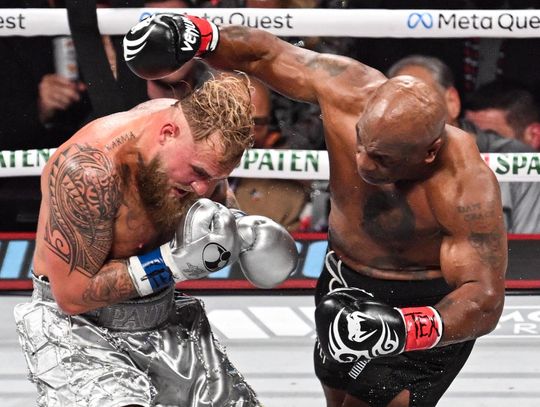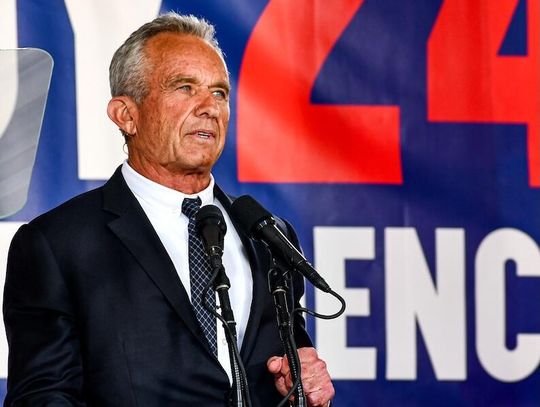Bob,
czy ty mnie pamiętasz?
Widziałem ciebie milion lat temu w klubie folkowym na ulicy Wells w Chicago. Może był to 1962 lub 1963 rok. Klub nazywał się “The Earl of Old Town”, ale nie jestem już niczego pewien. Moja pamięć cuchnie. Wtedy miałem 15 lat, dziś już tyle nie mam, ale nie ma to znaczenia.
Pamiętam, że była to bardzo śnieżna noc. Śnieżyca unieruchomiła wszystkie autobusy, ale ja tak bardzo chciałem ciebie posłuchać. Więc poszedłem ulicą North z Humboldt Park aż do klubu – z mojego domu to ponad 3 mile, poprzez śnieg. Czasami chodniki były tak zawalone śniegiem, że musiałem zejść na ulicę. Zajęło mi to dwie godziny marszu, ślizgania się i upadków. Nie dbałem o to i nie martwiłem się, że ciebie może tam nie być. Znałem ciebie dzięki twoim piosenkom i to one mi powiedziały, że nie poddajesz się niezależnie od wszystkiego.
Śpiewałeś „Don't Think Twice” i „Blowing in the wind”, mimo że tej nocy w klubie nie było nas zbyt wielu. Tylko garstka. Wiele samochodów nie mogło przebić się przez śnieżne zaspy i oblodzone ulice.
Pamiętam, jak w pewnym momencie przestałeś spiewać i zacząłeś żartować o tym, jak to wszyscy będziemy skazani na spędzenie nocy ze sobą w “Earl of Old Town”, przytuleni, ponieważ śnieg na zewnątrz mówił: „Nikt nigdzie się nie wybiera” (Ain't nobody going nowhere). Śmialiśmy się z tobą i mówiliśmy, że jesteśmy gotowi.
Pamiętam ostatnią piosenkę, którą zaśpiewałeś tego wieczoru. To było “The Walls of Red Wing” (Red Wing – zakład poprawczy dla nieletnich w Minnesocie – przyp. red.) . Powiedziałeś, że chciałbyś zaśpiewać coś o Minnesocie, która jest twoim domem na północy kraju, chciałeś pamiętać tamte zimy, jakie były ponure, zimne, nieskończone; chciałeś też pamiętać, jak wyglądali chłopcy przebywający w poprawczaku.
Pamiętam, że wszyscy przyłączyliśmy się do refrenu, cała nasza piątka, a potem wyszedłem w śnieg i marznący wiatr i rozpocząłem długą drogę powrotną do domu, nucąc twoje piosenki, zwłaszcza ostatnią. Śpiewałeś w niej o tym, co może się stać z młodymi chłopcami w Red Wings. Zacząłem myśleć o tym, jak pewnego dnia kiedy dorosnę, mógłbym zostać lekarzem, albo prawnikiem lub kimś podobnym, a może skończyć za murami poprawczaka Red Wings.
I nucąc te piosenki i myśląc o mnie i bohaterach tych utworów, nie zauważyłem, że śnieg padał mocniej, a wiatr wdzierał się od jeziora Michigan.
Twój,
John Guzlowski
A Letter to Bob Dylan -- A Winter Memory
Dear Bob, do you remember me?
I saw you about a million years ago in a folk club on Wells Street in Chicago. Maybe it was 1962 or 1963. I think the club was the Earl of Old Town, but I'm not so sure anymore. My memory stinks. I was like 15 years old then, now I'm not, but that doesn’t matter.
I remember it was a snowy night, a blizzard wind had stopped all the buses, but I wanted to see you bad. So I walked down North Avenue from Humboldt Park to the club, more than 3 miles through the snow from my house. Sometimes the sidewalks were so jammed up with snow I had to walk in the street. It took me two hours of walking and slipping and sliding and falling down. I didn’t care, and I didn’t worry that you wouldn’t be there. I knew you through your songs, and your songs told me that you didn’t give up no matter what.
You sang “Don't Think Twice” and “Blowing in the Wind” even though there weren't too many of us in the club that night. Just a handful. A lot of cars weren't getting through the banks of snow and the ice-covered streets either.
I remember at one point you stopped singing, and you started joking about how we would all have to spend the night together at the Earl of Old Town and cuddle up together because the snow outside was saying, “Ain't nobody going nowhere.” We laughed with you and said we were ready.
I remember the last song you sang that night. It was a song called “The Walls of Red Wing.” You said you wanted to sing something about Minnesota, your home in the north country there, wanted to remember the winters there, how bleak they were, how cold, how endless, wanted to remember too what the boys housed in the prison there were like.
I remember we all joined in on the chorus, all five of us, and then I went out into the snow and the frozen wind and began the long walk home humming your songs, especially the last one. In it, you sang about what might happen to the young boys in Red Wing prison, and I started thinking too about how someday I'd maybe grow up to be a doctor or lawyer or such, or maybe I'd end up inside the walls of the prison at Red Wing.
And humming those songs and thinking about me and the people in them, I didn’t notice the snow falling harder and the wind cutting its way up from Lake Michigan.
Yours,
John Guzlowski
amerykański pisarz i poeta polskiego pochodzenia. Publikował w wielu pismach literackich, zarówno w USA, jak i za granicą, m.in. w „Writer’s Almanac”, „Akcent”, „Ontario Review” i „North American Review”. Jego wiersze i eseje opisujące przeżycia jego rodziców – robotników przymusowych w nazistowskich Niemczech oraz uchodźców wojennych, którzy emigrowali do Chicago – ukazały się we wspomnieniowym tomie pt. „Echoes of Tattered Tongues”. W 2017 roku książka ta zdobyła nagrodę poetycką im. Benjamina Franklina oraz nagrodę literacką Erica Hoffera, za najbardziej prowokującą do myślenia książkę roku. Jest również autorem dwóch powieści kryminalnych o detektywie Hanku Purcellu oraz powieści wojennej pt. „Road of Bones”. John Guzlowski jest emerytowanym profesorem Eastern Illinois University.
—
John Guzlowski's writing has been featured in Garrison Keillor’s Writer’s Almanac, Akcent, Ontario Review, North American Review, and other journals here and abroad. His poems and personal essays about his Polish parents’ experiences as slave laborers in Nazi Germany and refugees in Chicago appear in his memoir Echoes of Tattered Tongues. Echoes received the 2017 Benjamin Franklin Poetry Award and the Eric Hoffer Foundation's Montaigne Award for most thought-provoking book of the year. He is also the author of two Hank Purcell mysteries and the war novel Road of Bones. Guzlowski is a Professor Emeritus at Eastern Illinois University.
Na zdjęciu: Bob Dylan
fot. EPA/Shutterstock










